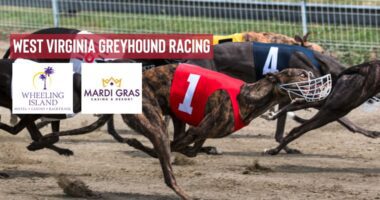
The last greyhound race in Arkansas took place at Southland Casino Hotel in West Memphis on New Year’s Eve. Currently, West Virginia is the sole state that continues to offer greyhound racing in the United States. However, the future duration of this sport remains uncertain.
West Virginia greyhound races are exclusively held at Wheeling Island Casino in Ohio County and Mardi Gras Casino & Resort near Charleston.
In order to run a casino that is licensed by the state, it is necessary to comply with the state law. However, there are speculations that the state legislature, which will convene this year, might modify this requirement. Among those who advocate for the continuation of casino operations is Sen. Ryan Weld, a representative from Brooke, belonging to the Republican party.
He asserts that it is a humane pastime which brings economic advantages to the region he represents. In fact, he personally visited a greyhound adoption center and adopted a retired racer as well.
Carey Theil, the executive director of the national nonprofit organization Grey2KUSA, is among those who advocate for the cessation of greyhound racing. While his primary concerns revolve around the health and well-being of greyhounds, he has also raised some financial concerns for the state.
Delaware North, the owner of the two remaining casino/dog tracks, is not opposed to the idea of ending the sport. Due to declining revenues, the company’s spokesperson informed WV Public Broadcasting (WVPB) that they would be in favor of legislation that permits them to run the casinos independently, without the need for racing operations.
Greyhound racing attendance on a steep decline; could this be the end?
According to the Associated Press, the sport of dog racing reached its highest point in popularity during the 1980s, boasting 50 tracks spread across 19 states. However, since then, concerns regarding the welfare of greyhounds and the rise of accessible gambling options have caused a decline in the sport’s popularity.
According to reports, the betting on Greyhound racing witnessed a significant decline, falling from $3.5 billion in 1991 to $500 million in 2014. Moreover, the revenue generated from this sport may have experienced a further drop after Florida, which had long been known as a hub for dog racing, discontinued the activity in early 2021.
However, in West Virginia, a law implemented in 2007 requires all state-operated casinos to include either dog or horse racing. Despite this, in 2017, a bill was introduced to separate the state from dog racing, gaining legislative approval but ultimately being vetoed by Gov. Jim Justice.
There is ongoing debate regarding the potential impact of the 2025 legislative session on the future of the sport. However, Del. Shawn Fluharty, a Democrat from Ohio, disagrees with this notion and criticized Grey2KUSA as a “propaganda machine.”
On his part, Theil questioned whether West Virginia desires to remain as the final state permitting the occurrence of a sport that occasionally leads to injuries. He believes that the legislature possesses adequate votes to repeal the law implemented in 2007.
Delaware North has observed a notable decline in attendance and an increase in the age demographic of individuals who attend greyhound races, impacting the financial aspect of this sport. Over the past five years, the company has experienced a consistent decrease in revenues.
- Wheeling: -60%
- Mardi Gras: -40%
According to Theil, it is widely acknowledged that the current revenue primarily stems from simulcasting. However, breeders do not receive any portion of this revenue. Additionally, Theil mentioned that the corporate profit percentage is merely 3% during his conversation with WVPB.
This implies that the profits ultimately end up in the hands of gambling companies located outside of the state.
An industry surrounded by controversy
The welfare of greyhounds continues to be a major concern for many, with the ASPCA denouncing dog racing as a cruel practice.
Delaware North expressed its commitment to upholding the utmost level of safety and well-being for the dogs. Within the industry, there is a prevalent belief that significant progress has been made in this regard, with dogs no longer being viewed as disposable.
Wheeling veterinarian Lori Bohenko states that the sport experiences very few severe injuries. The veterinarian for Mardi Gras claims that staffing difficulties due to the pandemic resulted in 600 racing injuries and 10 fatalities last year.
In contrast, Theil expressed his view that the loss of 10 greyhounds was deemed unacceptable, stating, “If ten high school football players were to perish, it would not be deemed acceptable.” Furthermore, it is important to acknowledge that harm inflicted upon animals may extend beyond just the dogs.
According to Steve Serras, president of the West Virginia Kennel Owners Association and a greyhound breeder, it is advantageous for his business if his dogs receive proper care. To ensure this, the state requires approximately $17 million annually from casino gaming profits to be allocated towards supporting kennel and breeding operations.
Even if they don’t emerge victorious, the West Virginia Greyhound Breeding Development Fund offers support to approximately 1,500 individuals working in the state’s racing sector while ensuring the well-being and secure future of the dogs.
In 2017, Gov. Justice vetoed the bill that aimed to terminate the subsidy.
The cessation of greyhound racing in several states was either prompted by the voters’ desire or due to casinos voluntarily relinquishing the accompanying subsidies. In West Virginia, a gradual phaseout that considers the well-being of racing dogs and workers could potentially mitigate opposition.
For over three years, Delaware North, the owner of the Arkansas track at Southland, diligently collaborated with kennels in anticipation of its closure.






